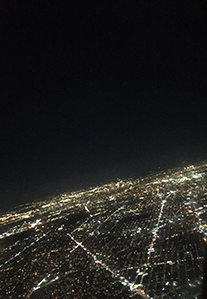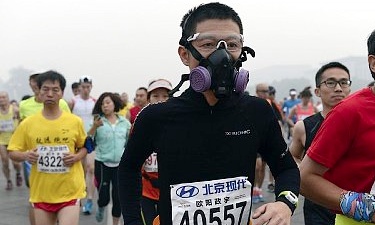I’ve been re-reading an old issue of Harper’s Magazine from 2007 that I came across in the home kids office while looking for something else – love when that happens, though it’s something that is being disappeared by our ability to search the internet and find only what we want (but that’s another issue for another Friday).
Anyway, there’s a fantastic article by Pankaj Mishra in that issue, a review of two books on India and China. A man after my own heart, the article is called It’s a round world after all: India, China, and the global economy and Mishra provides full service by going back to the musings of Henry Luce in Time and Life to show how western commentators, governments, markets and financial sectors (currently, we are ruled in all but name by a mash-up of these last three two) have consistently gotten China and India wrong, with vast and mostly irredeemable consequences for all of us. Unfortunately, this fine piece of history and journalism is behind a paywall and hence, will not be our focus right now, but I encourage you to seek it out if at all possible (come hither, internets!).
What I will share is this review by Mishra of Civilisation: The West and Rest by Niall Ferguson, wherein he essentially uses Ferguson’s book to chart the same map – the folly of our solipsistic worldview regarding Asia, history, basically any other people. After starting off with an analogy using my favorite protag and yours, Nick Carraway, for a side riff on Ferguson’s earlier book, the Pity of War, he gets on to the matter at hand:
This wistful vision of an empire on which the sun need never have set had an immediately obvious defect. It grossly underestimated – in fact, ignored altogether – the growing strength of anti-colonial movements across Asia, which, whatever happened in Europe, would have undermined Britain’s dwindling capacity to manage its vast overseas holdings. At the time, however, The Pity of War seemed boyishly and engagingly revisionist, and it established Ferguson’s reputation: he was opinionated, ‘provocative’ and amusing, all things that seem to be more cherished in Britain’s intellectual culture than in any other.
In retrospect, The Pity of War’s Stoddardesque laments about the needless emasculation of Anglo-Saxon power announced a theme that would become more pronounced as Ferguson, setting aside his expertise in economic history, emerged as an evangelist-cum-historian of empire. He was already arguing in The Cash Nexus, published a few months before the terrorist attacks of 11 September 2001, that ‘the United States should be devoting a larger percentage of its vast resources to making the world safe for capitalism and democracy’ – if necessary by military force. ‘Let me come clean,’ he wrote in the New York Times Magazine in April 2003, a few weeks after the shock-and-awe campaign began in Iraq, ‘I am a fully paid-up member of the neoimperialist gang.’
Empire: How Britain Made the Modern World (2003), Ferguson’s next book, appeared in America with a more didactic subtitle: ‘The Rise and Demise of the British World Order and the Lessons for Global Power’. The word ‘empire’ still caused some unease in the US, whose own national myths originated in an early, short-lived and selective anti-imperialism. An exasperated Ferguson – ‘the United States,’ he claimed, ‘is an empire, in short, that dare not speak its name’ – set out to rescue the word from the discredit into which political correctness had apparently cast it. Britain’s 19th-century empire ‘undeniably pioneered free trade, free capital movements and, with the abolition of slavery, free labour. It invested immense sums in developing a global network of modern communications. It spread and enforced the rule of law over vast areas.’ ‘Without the spread of British rule around the world,’ he went on, in a typical counterfactual manoeuvre, colonised peoples, such as Indians, would not have what are now their most valuable ideas and institutions – parliamentary democracy, individual freedom and the English language.
America should now follow Britain’s example, Ferguson argued, neglecting to ask why it needed to make the modern world if Britain had already done such a great job. He agreed with the neocon Max Boot that the United States should re-create across Asia the ‘enlightened foreign administration once provided by self-confident Englishmen in jodhpurs and pith helmets’. ‘The work needs to begin, and swiftly,’ he wrote, ‘to encourage American students at the country’s leading universities to think more seriously about careers overseas.’
Ferguson’s proposed ‘Anglobalisation’ of the world was little more than an updated version of American ‘modernisation theory’, first proposed as an alternative to Communism during the Cold War, and now married to revolutionary violence of the kind for which Communist regimes had been reviled. It makes for melancholy reading in 2011. But in the first heady year of the global war on terror, easy victories over the ragtag army of the Taliban ignited megalomaniacal fantasies about the ‘Rest’ across a broad ideological spectrum in Anglo-America, from Ann Coulter arguing that ‘we should invade their countries, kill their leaders and convert them to Christianity’ to the unctuous ‘Empire-Lite’ of Michael Ignatieff and the ‘liberal imperialism’ peddled by Robert Cooper, one of Blair’s fly-by-night gurus. ‘Islamofascism’ seemed as evil as Nazism, Saddam Hussein was another Hitler, a generation-long battle loomed, and invocations of Winston Churchill – ‘the greatest’, according to Ferguson, ‘of all Anglo-Americans’, his resolute defence of English-speaking peoples commemorated by a bust in the Bush White House – seemed to stiffen spines all across the Eastern Seaboard.
The reception a writer receives in a favourable political context can be the making of him. This applies particularly well to Ferguson, whose books are known less for their original scholarly contribution than for containing some provocative counterfactuals. In Britain, his bluster about the white man’s burden, though largely ignored by academic historians, gained substance from a general rightward shift in political and cultural discourse, which made it imperative for such apostles of public opinion as Andrew Marr to treat Ferguson with reverence. But his apotheosis came in the United States, where – backed by the prestige of Oxbridge and, more important, a successful television series – he became a wise Greek counsellor to many aspiring Romans. He did not have to renounce long-held principles to be elevated to a professorship at Harvard, primetime punditry on CNN and Fox, and high-altitude wonkfests at Davos and Aspen. He quickly and frictionlessly became the most conspicuous refugee from post-imperial Britain to cheerlead Washington’s (and New York’s) consensus.


 The reason for the dome becomes apparent when you step outside. A grey blanket hangs in the sky, swamping the surroundings in a de-saturated haze and almost o
The reason for the dome becomes apparent when you step outside. A grey blanket hangs in the sky, swamping the surroundings in a de-saturated haze and almost o